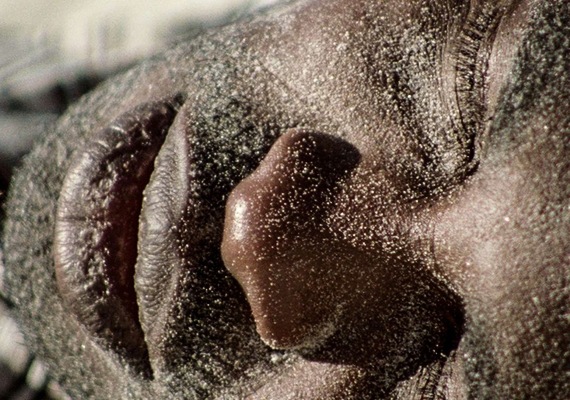@Filmhouse Edinburgh Fri 23 Jun 2017 & Sun 25 June 2017
Part of Edinburgh International Film Festival
The opening credits of The Sun, the Sun Blinded Me (Słońce, to słońce mnie oślepiło) announce that the film was inspired by the short Albert Camus novel L’Étranger and it begins as a very faithful adaptation of the source material. We are introduced to the protagonist Meursault (renamed Mularz for the Polish film), his obsessive running habits, his indifference to the rest of society and the lack of emotion he shows at his mother’s funeral.
The cinematography is put to good use here, with the camerawork relying on intense close-ups of the main character to convey his sense of isolation from society, while the wobbly, out-of-focus panoramas augment the effect. Rafał Maćkowiak is also adept in the role of Mularz, communicating his dead-eyed disinterest in those around him and his complete lack of empathy with almost chilling ability.
It’s exactly these idiosyncrasies which make Meursault the eponymous outsider of the novel, but the Sasnals (who share the director’s chair) have turned the title on its head by aiming that epithet at the immigrant which Mularz encounters on the beach while vacationing. It’s a neat idea; Camus’ work always contained an undercurrent of racial intolerance, but this was heavily overshadowed by Meursault’s own peculiarities. By bringing the immigrant to the fore, the Sasnals have transplanted the action to a more overtly xenophobic setting, which couldn’t be more relevant in the wake of recent global politics.
Unfortunately, although the idea is a sound one, the execution is poor. The story-line is as shaky as the cinematography, with the exact sequence of events almost impossible to pin down. The dialogue is sometimes factually inaccurate, which may well be a deliberate technique to make a point about discrimination, but can be confusing and contributes to flimsiness in the script. And the exclusion of the character of Raymond Sintès, one of the most interesting and incendiary personalities in the novel, is a bizarre decision which leaves a gaping hole in both the plot and its ability to engage the audience.
Finally, and most damning of all, the film does very little to explore the themes of xenophobia and racial intolerance other than switching the title to refer to the anonymous immigrant. Rather than making any nuanced points about societal attitudes to those different from ourselves, it simply dumps the topic in front of us with cack-handed clumsiness, before the final credits roll and the lights come up.
The sun may have blinded Mularz, but it appears the Sasnals were blinded by the brilliant promise of their adaptation. Rather than seeing that promise through to its full potential, they’ve ended up with a victory for style over substance and a missed opportunity to explore some very salient ideas about modern society.
